“Making money in Angola is about connections, not hard work”
“Where others need connections, I can succeed through hard work”
“I am an egalitarian, but want to work in the financial industry”
How to cite this publication:
Ivar Kolstad, Arne Wiig, Vissolela Chivunda (2017). “Making money in Angola is about connections, not hard work”. Bergen: Chr. Michelsen Institute (CMI Brief 12)
What do the educated future of Angola make of their future in Angola? A recent survey of university students in Angola documents a grave concern about inequality, and strong preferences for redistribution. At the same time, many students see a path to success through hard work which is not available to people in general.
“Where others need connections, I can succeed through hard work”
Angola is an oil economy, one of the most concentrated economies in the world. It has a level of inequality that is believed to be high (though updated data confirming this is scarce). Corruption is rife, and the economy characterized by patronage and rent-seeking. As such, the economy does not operate on meritocratic principles, where the talented and hard working rise to the top. But how is this perceived among the educated future of Angola, the university students that will soon enter the Angolan labour market?
In March 2017, we conducted a survey of 316 economics students at the Catholic University of Angola, located in the capital of Angola. While from relatively privileged backgrounds compared to the average Angolan, our students are not part of the top elite, whose sons and daughters typically study abroad. Their responses provide a disconcerting (if not entirely surprising) view of inequality in Angola, while at the same time raising a number of interesting puzzles.
About 98 per cent of the surveyed students agree or strongly agree with the statement “Inequality is a large problem in Angola”. What is more interesting are student views on what creates income differences in the country. Table 1 presents the number of respondents who think that income in Angola is mainly the result of luck, inheritance, connections, hard work and talent, respectively. Connections is by far the most common response, given by more than two thirds of respondents. Only one in five believes that factors such as hard work and talent, which typically form the basis of a meritocratic system, matter for incomes.
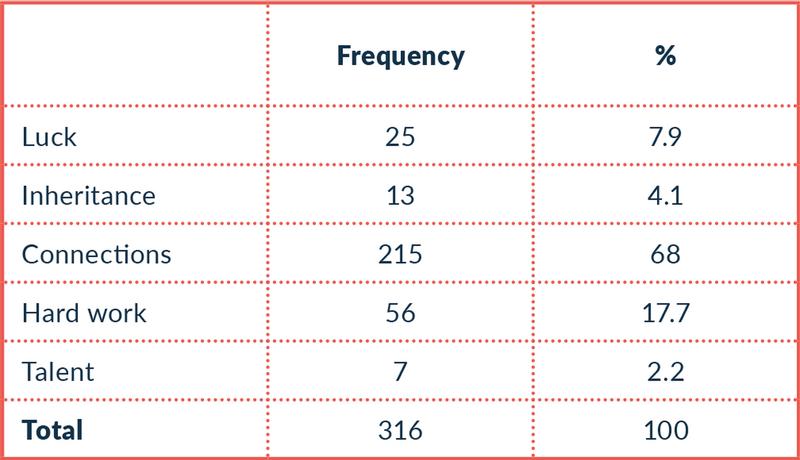
In a further question, we asked students about how much these five factors matter for their own chances of doing well. Almost 48 per cent answer that hard work and talent is what matters in this case. And as Table 2 shows, 95 of our respondents believe that while connections, luck and inheritance is what people in general need to do well in Angola, they themselves will do well through hard work and developing their talents.
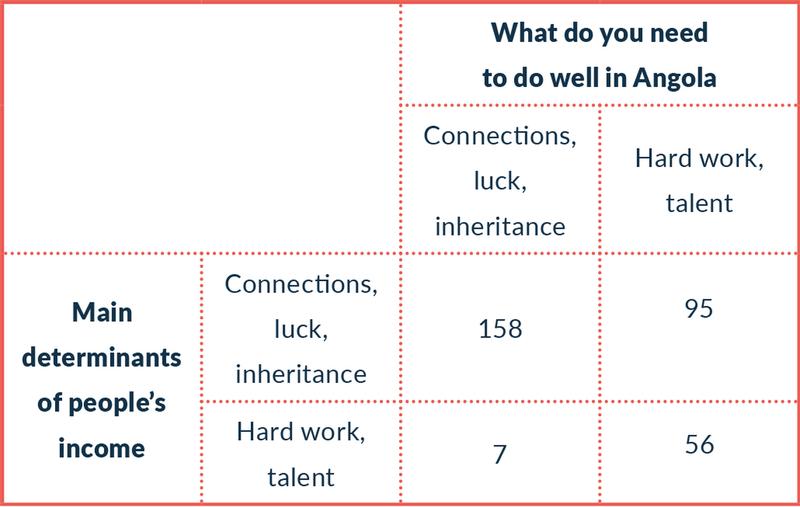
Many students hence believe that the regularities that govern other people’s lives in Angola, to a lesser extent applies to them. There can be several explanations for this discrepancy. One is overconfidence. Or it could be that our students, who are from wealthier backgrounds than the average Angolan, are in fact better positioned to reap the benefits of hard work and developing their talents. They could already have the connections through which they can make hard work pay off.
“I am an egalitarian, but want to work in the financial industry”
The students express a strong preference for equality and redistribution. Box 1 presents the first of four questions we asked them about their distributive preferences. By making the initial distribution of income completely unrelated to meritocratic factors, the question isolates unfair inequality. The respondent is asked whether they would like to keep the original uneven allocation (option A), redistribute income moderately (option B) or equalize income fully (option C). The total income available for distribution between the two individuals decreases as incomes are made more equal, there is in other words an efficiency loss associated with equalizing incomes. The extent of the efficiency loss varied between the four questions, which were otherwise the same. In the question in Box 1, the efficiency loss from full equalization is 20 per cent, in our other questions the loss was 50 per cent, 75 per cent, and an efficiency gain of 20 per cent in the last question.
Imagine two people that you don’t know who work equally hard at the same job. One person receives 20.000 Kwanza for the job, the other person gets nothing. You can take some money from the first person and give to the second. But taking from one and giving to the other is costly, due to administration costs. So the two people get less money in total the more equally you divide the money.
Which of these three options would you choose?
A. Let the first person keep 20.000 Kwanza, and the second person get nothing. In total they get 20.000 Kwanza.
B. Let the first person keep 14.000 Kwanza, and give the second person 4.000 Kwanza. In total they get 18.000 Kwanza.
C. Let the first person keep 8.000 Kwanza, and give the second person 8.000 Kwanza. In total they get 16.000 Kwanza.
The responses to these four questions are presented in Table 3, in order of increasing efficiency costs. We find that the respondents generally support complete equalization of payments (option C), so most students have a strong egalitarian bent, even with an efficiency loss of 75 per cent of the overall pie. In general, answers are also consistent in the sense that more people favour full equalization the lower the efficiency costs (with 278 respondents or 88 per cent supporting equalization on question 1, where there is an efficiency gain of 20 per cent).
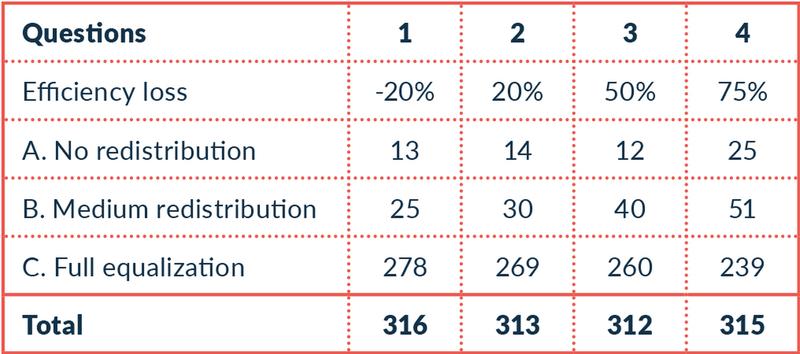
That students have radical views of redistribution is perhaps not that surprising. What is interesting is how this relates to what students plan to do with their own lives and careers. We asked students which sector they plan to work in when they finish their studies. A summary of the results are given in Table 4. It turns out that the financial industry is the career choice for over 70 per cent of the students, with an additional 8 per cent planning a career in the extractive industries.
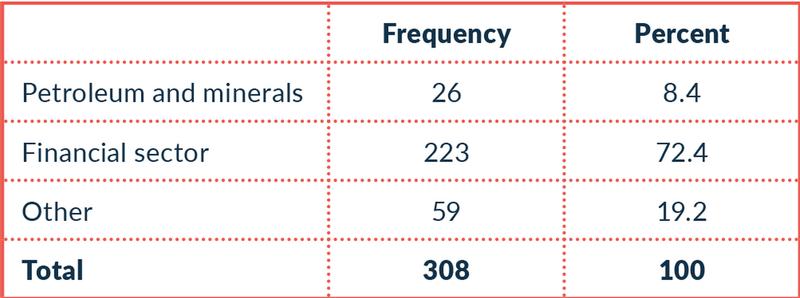
These are high paying sectors, with central roles in how the resource wealth has impacted on Angolan society. While working in these sectors is not necessarily inconsistent with being egalitarian, it does point to some possible inconsistencies between the questions given in our hypothetical scenarios where acting like an egalitarian is costless, and the life our respondents envision on top of the Angolan food chain. The responses of our students may also highlight the challenge of rent-seeking in oil rich countries, where high skilled individuals tend to flow to occupations where they can acquire a piece of the existing pie of oil revenues, rather than expand the pie through entrepreneurial activity.
“My distributive preferences? I’m not sure”
If our respondents have reasonable and well-ordered distributive preferences, they should not favour more redistribution as the efficiency loss from redistribution increases. In other words, across the four questions in Table 3, giving answers lower down as we move to the right, is inconsistent. Our results show that such inconsistencies are widespread, however. Fifteen per cent of our respondents make inconsistent choices, choosing more equal allocations as the efficiency loss increases. Even with our very simple distributive choices, the incidence of inconsistent choices is hence very high.
Moreover, our analysis of inconsistency covariates reveal systematic patterns, in particular that women tend to make inconsistent choices to a greater extent than men. Table 5 presents a simple breakdown by gender, indicating that women are about twice as likely to make inconsistent choices. This pattern holds also in multivariate regressions controlling for respondent age, household wealth, access to information, work status outside of their studies and more.
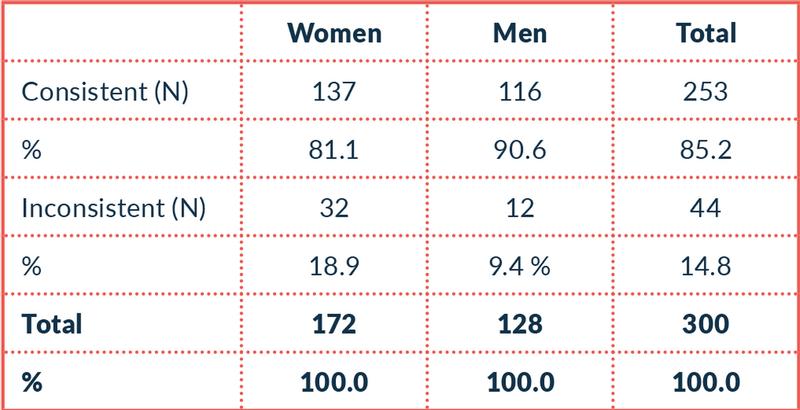
These results may reflect other unobserved differences between the men and women of our sample, such as different family backgrounds, and may hence not be a causal effect of gender. It is also possible that the choices we describe as inconsistent could perhaps better be described as learning in the sense that the distributive situations become clearer to respondents as more of the distributive questions are asked. Or respondents may hone and reconsider their preferences in the face of actual questions where they see the implications of applying them.
There is nevertheless a suggestion here that the resulting noise from inconsistent choices or preference reversals may be systematically related to individual characteristics. This creates potential biases in existing studies of inequality preferences which should be taken more seriously in studies on distributive preferences. If the inconsistencies uncovered reflect a more general pattern that applies also to other groups and in other countries, this may cast doubt on findings from the experimental literature on distributive preferences where such inconsistencies are not taken into account.
Conclusion
Angolans do not dream the American dream. While there has been much discussion of how oil economies often have unaccountable governments, our findings emphasize that accountability is also lacking in a more general sense: People are not generally rewarded for things they are responsible for, like hard work. If anything, our results suggest that effort may pay off only for those who have the complementary asset needed to succeed in a patrimonial oil economy: Connections. Dynamics of this kind likely perpetuate the high level of inequality in Angola.







